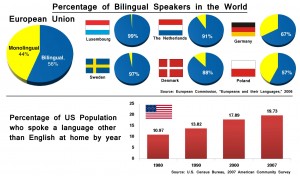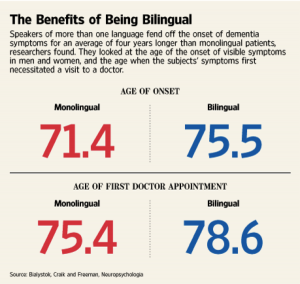All of us have experienced the difficulties of learning a second language. Whether your reason for struggling through a whole new set of grammar and vocabulary was purely to satisfy your COM2 requirement, or whether you had a true personal interest in learning another language or were raised in a bilingual household, most of us can agree that there are certain benefits to bilingualism.

But did you ever think that bilingualism could actually be benefiting your brain?
Research shows that bilingualism does just that. “How could it possibly help my brain just to know another language?” you might ask. Here’s the basic idea:
In a 6-week study at Penn State, researchers scanned the brains of American, English-speaking subjects before and after they learned Chinese vocabulary. The brain scans after the 6 weeks ended showed some interesting findings:
- Those who were successful at learning the new language showed increased connectivity within their brains
- Their brain networks were better integrated, leading to increased flexibility and efficiency
- Their brains showed increased density in grey matter, as well as strengthened white matter
The study showed that these findings were consistent across the average life span, meaning that even older brains showed these same structural and functional  changes with language learning. The short span of the study, only 6 weeks, also
changes with language learning. The short span of the study, only 6 weeks, also
showed that these changes could occur rapidly with shorter, intensive periods of language learning.
The brain itself clearly changes due to the presence of bilingualism, but there are other benefits to it as well:
- A study done by Dr Thomas Bak found that, on average, multilingual people develop dementia four years later than monolinguals
- Bak also found that multilingual young adults had better attention spans and could more easily ignore unnecessary information
 So why doesn’t everyone just learn every language known to man? Well, there are some difficulties to bilingualism as well.
So why doesn’t everyone just learn every language known to man? Well, there are some difficulties to bilingualism as well.

That moment when you start thinking in two languages at the same time
For instance, it was found through an fMRI study that native and secondary languages are separated from one another in Broca’s area, but are not separated in Wernicke’s area. This finding illustrates that often in learning a foreign language it isn’t comprehension (controlled by Wernicke’s area) that is difficult but instead is the actual formation of the words into speech (controlled by Broca’s area) that causes problems.
Interestingly, it is just those foreign phonemes, or bits of sound that make up words, that adults struggle with that their infants are babbling to them on a daily basis. Babies’ brains are equipped to learn whatever language is taught to them, and so they can access phonemes of foreign languages before their own language’s phonemes take over fully. It is this concept that makes it harder for adults to access the phonemes that make up foreign languages and is often why adult speakers never develop a perfect accent in a second or third language.
Hopefully by now you’re convinced; learning a second language has numerous benefits not only to your brain structure but also to your life. Here’s a short summary of some of the benefits of bilingualism:
